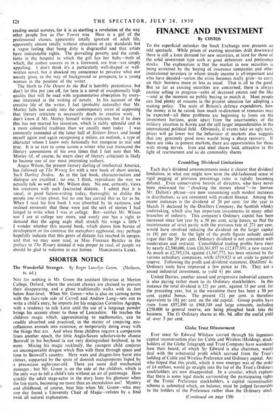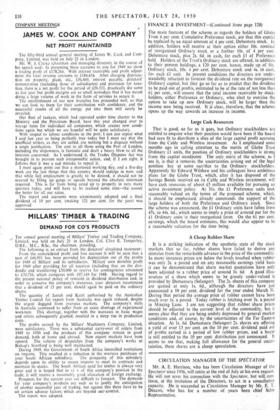FINANCE AND INVESTMENT
By CUSTOS To the superficial onlooker the Stock Exchange now presents an odd spectacle. -While prices of existing securities drift downward there is still a keen demand for new securities, at least for those of the solid investment type such as good debenture and preference stocks. The explanation is that the market in new securities is being sustained by the buying of insurance companies and other institutional investors to whom steady income is all-important and who have decided—unless the crisis becomes really grim—to carry on their business more or less as usual. That is all to the good. But so far as existing securities are concerned, there is always routine selling in progress—sales of deceased estates and the like —and at the moment no public buying to match it. Most people can find plenty of reasons in the present situation for adopting a waiting policy. The scale of Britain's defence expenditure, how the money is to be raised, how much re-direction of resources may be expected—all these problems are beginning to loom on the investment horizon, quite apart from the uncertainties of the military situation in Korea and the still larger imponderables in the international political field. Obviously, if events take an ugly turn, prices will go lower but the behaviour of markets also suggests that any genuinely good news would bring a sharp recovery. If there are risks in present markets, there are opportunities for those with strong nerves. Iron and steel shares look attractive in the light of rearmament and so do commodity shares: Crumbling Dividend Limitations Each day's dividend announcements make it clearer that dividend limitation, in what one might now term the old-fashioned sense of rigid pegging of previous percentage rates. is rapidly becoming defunct. Even conservative boards of directors, who have never been renowned for " chucking the money about "—to borrow Mr. Dalton's phrase—are now- announcing such modest increases in distributions as are consistent with prudent finance. Among the recent instances is the dividend of 20 per cent. for the year to March 31 declared by the Distillers Company, the Scottish whisky undertaking, which also has important investments in many other branches of industry. This company's Ordinary capital has been increased since last year by a 50 per cent. scrip bonus, so that the maintenance of strict parity with the previous rate of 271- per cent. would have involved reducing the dividend on the larger capital to 181 per cent. In the light of the profit figures nobody could argue that the 20 per cent. Ordinary dividend is not consistent with moderation and restraint. Consolidated trading profits have risen by nearly £2,500,000, from £10,361,857 to £12,837,691, a new record. As much as £2,795,134, against £1,347,772, has been retained by the various subsidiary companies, white £519,923 is set aside to general reserve. Following the profit and dividend statement, Distillers' 4s. Ordinary units have improved a few pence to 18s. They are a sound industrial investment, to yield 41 per cent.
United Dairies, another sound and progressive industrial concern, is also paying rather more to its Ordinary stockholders. In this instance the total dividend is 121 per cent., against 15 per cent. for the preceding year, but in the meantime there has been a 50 per cent. capital bonus. The present 121 per cent. is therefore equivalent to 184 per cent. on the old capital. Group profits have risen from £852,890 to £968,549 and large amounts, including £250,000 to general reserve, are being ploughed back into the business. The £1 Ordinary shares at 48s. 9d. offer the useful yield of over 5 per cent.
Globe Trust Denouement Ever since Sir Edward Wilshaw carried through his ingenious capital reconstruction plan for Cable and Wireless (Holding), stock- holders of the Globe Telegraph and Trust Company have wondered how their board, of which Sir Edward is also chairman, would deal with the substantial profit which accrued from the Trust's holding of Cable and Wireless Preference and Ordinary capital. Any who hoped that this profit, which it now emerges was of the order of £4 million, would go straight into the lap of the Trust's Ordinary stockholders are now disappointed. In a circular, which explains that there is some legal doubt surrounding the participating rights of the Trusts' Preference stockholders, a capital reconstruction scheme is submitted which, on balance, must be judged favourable to the holders of the Preference rather than the Ordinary stock.
• (Continued on page 130) FINANCE & INVESTMENT—(Continued from page 128) The main features of the scheme as regards the holders of Globe Trust 6 per cent. Cumulative Preference stock, are that this capital be replaced by an equal amount of 4 per cent. Debenture stock. In addition, holders will receive at their option either 10s. nominal of reorganised Ordinary stock or a further 10s. of 4 per cent. Debenture stock, plus 2s. 6d. in cash, for each £1 of Preference held. Holders of the Trust's Ordinary stock are offered, in addition to their present holdings, a 120 per cent. bonus, made up of 10s. Ordinary stock, 10s. 4 per cent. Debenture stock and 4s. in cash, for each £ I unit. In present conditions the directors are under- standably reluctant to forecast the dividend rate on the reorganised Ordinary capital, but they go so far as to predict that the dividend to be paid out of profits, estimated to be at the rate of not less than 6+ per cent., will ensure that the total income receivable by stock- holders, either Preference or Ordinary, who elect to exercise the option to take up new Ordinary stock, will be larger than the income now being received. It is clear, therefore, that the scheme opens up the way towards an increase in income.
Large Cash Resources That is good, so far as it goes, but. Ordinary stockholders are entitled to enquire what their position would have been if the board had seen fit to distribute a slice of the large capital profit accruing from the Cable and-Wireless investment. As I emphasised some months ago in calling attention to the merits of Globe Trust Ordinary £1 units, the position of Ordinary stockholders is strong from the capital standpoint. The only merit of the scheme, as I see it, is that it removes the uncertainties arising out of the legal position but at some sacrifice to the Ordinary stockholders. Apparently Sir Edward Wilshaw and his colleagues have ambitious plans for the Globe Trust, which, after it has disposed of the Savings Bonds received on its Cable and Wireless investment, will have cash resources of about £5 million available for pursuing an active investment policy. At 31s. the £1 Preference units look reasonably 'valued on the terms of the proposed scheme, which, it should be emphasised, already commands the support of the large holders of both the Preference and Ordinary stock. Since the scheme was announced, the £1 Ordinary units have fallen from 47s. to 44s. 6d., which seems to imply a price of around par for the Ordinary units in their reorganised form. On the 6+ per cent. earnings, which the board estimates, this would also appear to be a reasonable valuation for the time being.
A Cheap Rubber Share It is a striking indication of the apathetic state of the stock markets that so far, rubber shares have failed to derive any stimulus from the remarkable advance in the price of the commodity. In many instances prices are below the levels touched when rubber was only 2s. a pound and on any reasonable earnings yield basis it can be demonstrated that share market quotations have only been adjusted to a rubber price of around ls. 6d. A good illus- stration of a share which seems to be grossly under-valued is provided by Darnansara (Selangor). The 2s. shares of this company are quoted at only Is. 6d., although the directors have just announced a 10 per cent. dividend for the year ended March 31. During that period the average price of rubber cannot have been much over Is. a pound. Today rubber is fetching over 3s. a pound in Mincing Lane. I am not suggesting that. rubber share prices should be adjusted to the current level of the commodity, but it seems clear that they are being unduly depressed by general market conditions and, of course, by the uncertainties of the Far Eastern situation. At ls. 6d. Damansara (Selangor) 2s. shares are offering a yield of over 13 per cent. on the 10 per cent. dividend paid out of profits earned in a period of low rubber prices, and a buyer is still entitled to the 10 per cent. distribution just announced. It seems to me that, making full allowance for the general uncer- tainties, these shares are a cheap- speculation.



































 Previous page
Previous page